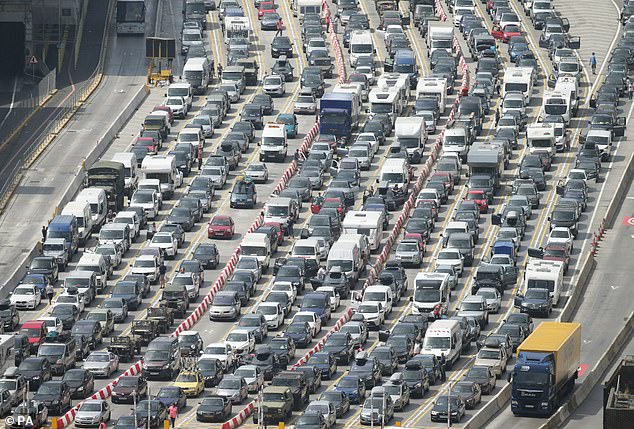New EU digital border controls expected to come into force in Dover today have been ‘paused on the guidance of French authorities’.
The European Entry/Exit System – known as EES –- was due to be extended today to car passengers after it was brought in for freight and coaches on October 13. Eurostar also introduced the system, initially with business class customers, at the same time.
By April 2026, every EU destination is expected to have EES in place, meaning the stamping of manual passports will end. It was originally expected to be introduced on a six-month phased rollout unless there are significant delays to the process.
EES applies to non-EU passengers including the UK travelling to countries within the EU Schengen zone – a group of 29 European countries – including France, Germany, Greece and Spain – who have a borderless zone between them.
But officials at Dover told the BBC that ‘they are being guided by the French authorities on when to start’ and that a ‘slow rollout’ was expected.
Passengers have been warned that the new biometric tests – which at Dover mean that they have to leave their cars and have their fingerprints and photo taken – could delay their journeys by hours.
Julia Lo Bue-Said, chief executive of Advantage Travel Partnership, a network of independent travel agents, told Radio 4’s Today programme: ‘What should have happened from this morning is that the checks that have been implemented for freight and coaches should have happened with cars.

Queues at Berlin Airport. By April 2026, every EU destination is expected to have EES in place, meaning the stamping of manual passports will end(stock)

Vehicles queueing at the Port of Dover in Kent. Passengers have been warned that the new biometric tests – which at Dover mean that they have to leave their cars and have their fingerprints and photo taken – could delay their journeys by hours
‘That would have meant people driving to a designated area, leaving their cars and making their way to the Western docks to do the biometric tests.’
Ms Lo Bue-Said said the full implications for travellers would not be seen until the system was tested at busy times but warned there had already been ‘bottlenecks at some airports’ despite the limited rollout at ‘a predominantly quiet time of year’.
Passengers only need to register once for the system, usually on arrival at their destination at an automated kiosk, with that registration lasting for three years unless a passport changes. But EES checks have to be completed before leaving the UK if you travel through the Port of Dover or Eurotunnel at Folkestone or St Pancras International.
Ms Lo Bue-Said warned that passengers at Dover would therefore still see delays even when they were registered because ‘the difference at Dover is having to get out of your car and going to Western docks to demonstrate you are registered’.
She added: ‘In airports it’s a little easier because you are not physically having to get out a vehicle.’
Share or comment on this article:
New EU border digital checks at Dover are paused by French authorities after fears over four-hour delays